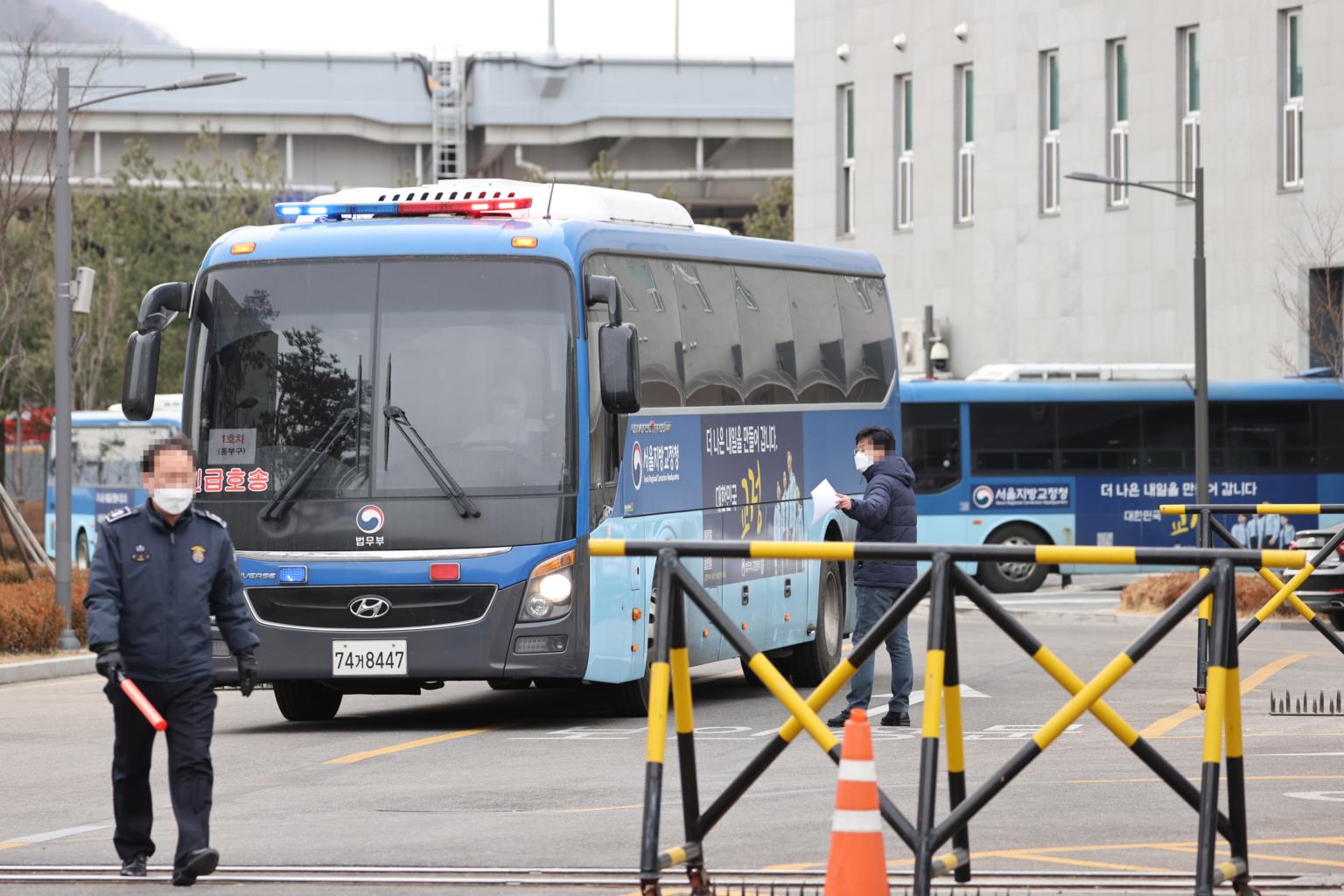Editorial Notes
South Korea's Covid-19 negligence: Korea Herald
In its editorial, the paper says authorities transfered nursing home patients belatedly, with infections surging at detention centers due to insufficient testing.
Sign up now: Get insights on Asia's fast-moving developments

Prison buses leave Dongbu Detention Center, which has reported more than 1,000 Covid-19 cases in recent months, in Seoul on Jan 3. 2021.
PHOTO: EPA-EFE
Follow topic:
SEOUL (THE KOREA HERALD/ASIA NEWS NETWORK) - Dozens of elderly Covid-19 patients residing in nursing homes or hospitals died last month without receiving proper treatment.
When coronavirus infections broke out there, the government put all the facilities under cohort isolation. But that was all. It could not transfer patients to hospitals that treat critical coronavirus cases due to a shortage of available sickbeds.
Negative pressure isolation units and respirators are essential in treating critical coronavirus patients. Medical workers specialized in the field are needed, too. However, most nursing homes or nursing hospitals do not have such medical equipment and personnel.
So, once they are shut down as cohorts without medical assistance from the outside, they become hotbeds for the coronavirus.
With criticism mounting over a spike in deaths at nursing homes and nursing hospitals under cohort isolation, the authorities belatedly transferred patients to hospitals or other facilities.
Infectious disease experts advised the government on numerous occasions to secure more sickbeds for critical Covid-19 patients. But it failed to keep its promise to increase hospital beds sufficiently.
As a result, serious coronavirus patients died at nursing homes or nursing hospitals waiting for empty sickbeds. The government should give priority in treatment to the facilities.
Mass infections at the Seoul Dongbu Detention Center show no signs of abating. On Saturday (Jan 2), 121 inmates there tested positive, raising the number of infections at the center to 1,084, or 43 per cent of its detainees. Nationwide, 1,108 inmates have been infected with the virus.
Detention centers or penitentiaries are vulnerable to epidemic spread. The Dongbu detention center was already overcrowded, so strict preventive measures were needed. But the center did not issue masks to its inmates, citing a budget shortfall.
Not until Dec 15 did the Justice Ministry make Covid-19 infections at the center known to the outside. The ministry first tested all of the center's inmates on Dec 18, three weeks after the outbreak of the virus there.
The center reported its first infection on Nov 27 and its first inmate death on Dec 29. Over this span, the number of infections shot up to 792. This period corresponds roughly with when Minister of Justice Choo Mi-ae tried to expel Prosecutor General Yoon Seok-youl.
She suspended Mr Yoon from duty and requested disciplinary action against him on Nov 24. The ministry's disciplinary committee voted to suspend him for two months on Dec 16.
It is questionable if the minister in charge of the detention center neglected her duty to protect the lives of inmates because she was absorbed in trying to drive the chief prosecutor out.
Prime Minister Chung Sye-kyun inspected the center Saturday, where he said, "It is a pity that the first response was insufficient."
Ms Choo did not mention Covid-19 infections at the center for about a month until she visited there briefly on Dec 29 for an inspection. Her first apology on Jan 1 came five weeks after the initial outbreak at the center.
She apologised again on the following day, but both her apologies, which were made via her social media, sounded lukewarm.
Testing inmates at the center came too late. Inmates who came into contact with infected inmates were not separated properly. As a result, over 1,000 inmates caught the disease.
Ms Choo is an outgoing minister as President Moon Jae-in has nominated her successor, but it will be difficult for her to avoid responsibility for the tragedy at the center even after she completes her resignation. The same is true of other related officials.
When looking back at the developments so far, it is doubtful if the authorities were dealing responsibly with Covid-19 infections at nursing homes, nursing hospitals or the detention center.
While the public have endured difficulties to observe tighter social distancing rules, the government has effectively neglected its obvious duty of protecting life.
Recently, some ruling party lawmakers are suspected of having violated rules limiting the size of social gatherings. How can the government expect people to cooperate and make sacrifices when it does not play its role faithfully?
It is a basic duty of government to protect people's lives. It must deal with the pandemic crisis with a stronger sense of responsibility.
The Korea Herald is a member of The Straits Times media partner Asia News Network, an alliance of 24 news media organisations.

